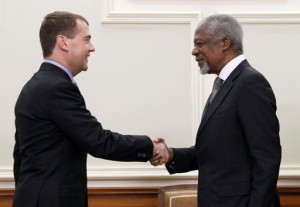UNITED NATIONS — Kofi Annan seems to have clinched a diplomatic deal in Damascus which may stop or at least decompress the debilitating year-long conflict in Syria which has taken 9,000 lives, mostly civilians. The former UN Secretary General in a bout of shuttle diplomacy has received approval from the Bashar Assad regime which appears to endorse a six point plan to stop the violence and start a slow process of political reconciliation.
But whether the Assad regime is playing for time and hoping the deal will defuse tensions, or is really willing to take a chance for peace remains highly debatable.
Western countries, especially the United States and Britain have reacted skeptically to the proposed agreement. Neighboring Turkey nervously questions Assad’s true intentions.

Kofi Annan’s plan is particularly focused on getting government military units to withdraw from major towns as well as opening humanitarian aid corridors inside Syria.
Though the six point plan was endorsed by the Security Council, the deal does not address the issue of President Assad stepping down, a key demand of the opposition. It does however carve out a humanitarian space of a two hour daily pause in the fighting for relief operations, calls on the government to “release arbitrarily detained persons,” allow for freedom of movement for journalists, and freedom of association and the right to protest for citizens.
The breakthrough came in Beijing, one of Syria’s allies, where Annan was trying to cajole the Chinese to get on board with the peace plan. Earlier Annan visited Moscow, meeting with Russian officials in a bid to get some flexibility on Syria, an old Kremlin client state.
“Mr. Annan views this as an important initial step that could bring an end to the violence and the bloodshed” stated his spokesman. Equally the accord would allow for political dialogue among many warring factions. Yet Annan, an experienced diplomat, was quick to stress “that implementation will be the key.”
Until now at least, both Moscow and Beijing have provided the Damascus rulers diplomatic cover fire in the UN Security Council where double Russian/Mainland Chinese vetoes were used twice to stop Western-backed draft resolutions. Now in a decidedly watered down deal, Syria’s two key political allies acquiesced to an amorphous arrangement which, as mentioned, does not call upon Assad to step down as ruler.
In the meantime fighting continues between splintered opposition groups and the Syrian military. Significantly, violence has spilled over into neighboring Lebanon. Moreover the UN Human Rights chief has charged that the Syrian government is deliberately “targeting children” in its crackdown on opposition.
Although the Arab League has censured Syria, the Islamic Republic of Iran has remained politically and military steadfast with the Assad family. Iranian Revolutionary Guards sniper teams and shock troops have been fighting inside Syria against regime opponents. The Islamic Republic Revolutionary Guards Corps has also supplied weapons to the Damascus regime as has Russia.
Interestingly, now Iran backs the Annan peace plan too. Foreign Minister Ali Akbar Salehi said that the “Syria issue should be dealt with patiently” and “any hasty approach to the Syria issue and the creation of a power vacuum in that country could have very damaging consequences for the region.”
True, but Teheran is clearly playing for time for its only Arab ally, save for a gaggle of terrorist groups.
Addressing the road ahead, Robert Serry, the UN’s special coordinator for the Middle East advised the Security Council delegates, “Immediate steps are needed now from the Syrian government to act on their commitment and demonstrate to the Syrian people that they are ready for a cessation of violence.”
That’s easier said than done, given that the devil is in the details of the six point plan. Sadly, the crisis in Syria is probably not over. Nor is Kofi Annan’s shuttle diplomacy.
John J. Metzler is a U.N. correspondent covering diplomatic and defense issues. He writes weekly for WorldTribune.com.


You must be logged in to post a comment Login